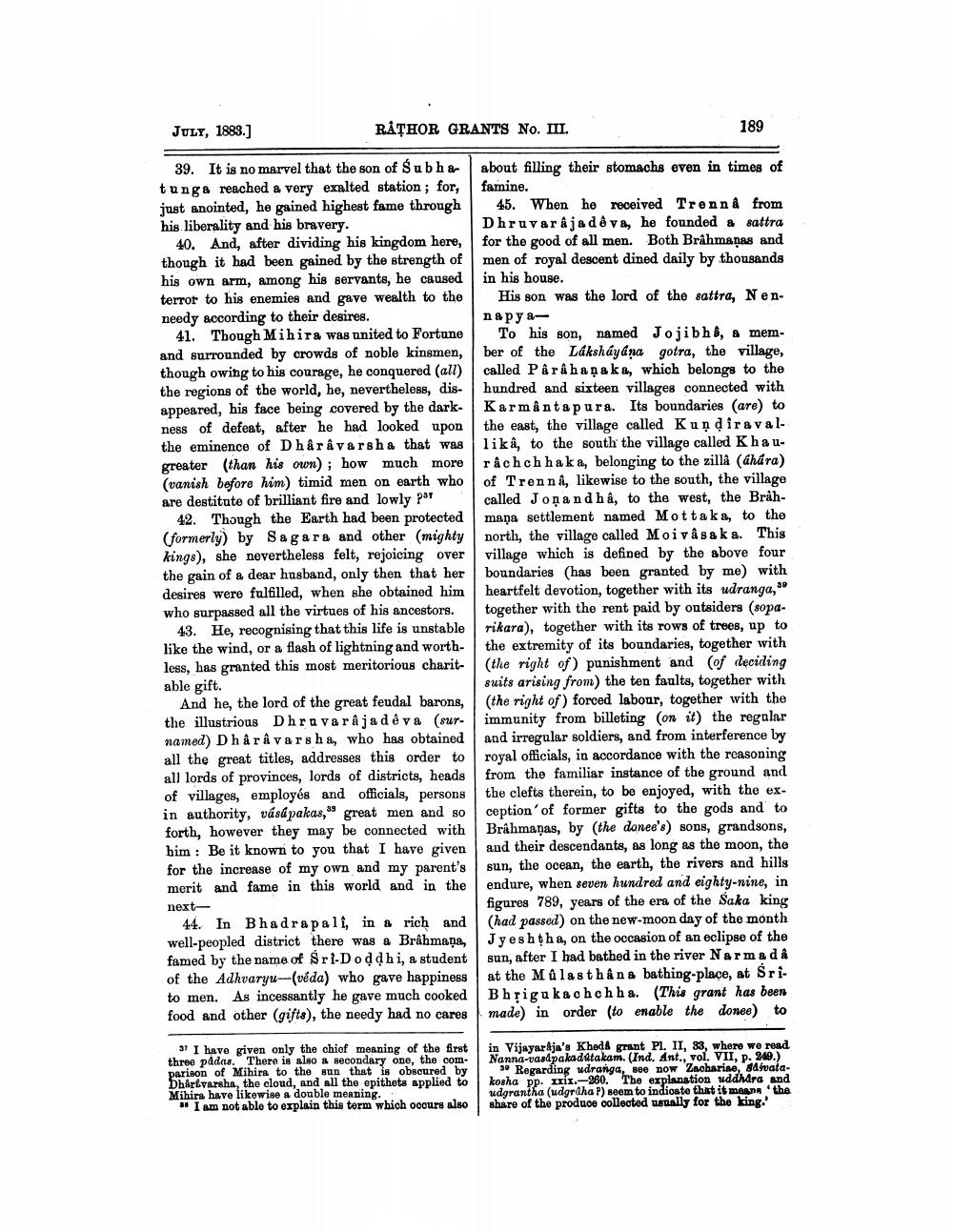________________
RATHOR GRANTS No. III.
JULY, 1888.]
39. It is no marvel that the son of Subhatunga reached a very exalted station; for, just anointed, he gained highest fame through his liberality and his bravery.
40. And, after dividing his kingdom here, though it had been gained by the strength of his own arm, among his servants, he caused terror to his enemies and gave wealth to the needy according to their desires.
41. Though Mihira was united to Fortune and surrounded by crowds of noble kinsmen, though owing to his courage, he conquered (all) the regions of the world, he, nevertheless, disappeared, his face being covered by the darkness of defeat, after he had looked upon the eminence of Dhârâvarsha that was greater (than his own); how much more (vanish before him) timid men on earth who are destitute of brilliant fire and lowly par
42. Though the Earth had been protected (formerly) by Sagara and other (mighty kings), she nevertheless felt, rejoicing over the gain of a dear husband, only then that her desires were fulfilled, when she obtained him who surpassed all the virtues of his ancestors.
43. He, recognising that this life is unstable like the wind, or a flash of lightning and worthless, has granted this most meritorious charitable gift.
And he, the lord of the great feudal barons, the illustrious Dhruvarajadêva (surnamed) Dhârâ varsha, who has obtained all the great titles, addresses this order to all lords of provinces, lords of districts, heads of villages, employés and officials, persons in authority, vásápakas, great men and so forth, however they may be connected with him: Be it known to you that I have given for the increase of my own and my parent's merit and fame in this world and in the
39
next
44. In Bhadrapali, in a rich and well-peopled district there was a Brahmana, famed by the name of Sri-Doddhi, a student of the Adhvaryu-(veda) who gave happiness to men. As incessantly he gave much cooked food and other (gifts), the needy had no cares
37 I have given only the chief meaning of the first three padas. There is also a secondary one, the comparison of Mihira to the sun that is obscured by Dharivarsha, the cloud, and all the epithets applied to Mihira have likewise a double meaning.
as I am not able to explain this term which occurs also
189
about filling their stomachs even in times of famine.
45. When he received Trennâ from Dhruvarajadêva, he founded a sattra for the good of all men. Both Brahmanas and men of royal descent dined daily by thousands in his house.
His son was the lord of the sattra, Nennapya
39
To his son, named Jojibh, a member of the Láksháyána gotra, the village, called Pârâhanaka, which belongs to the hundred and sixteen villages connected with Karmântapura. Its boundaries (are) to the east, the village called Kundiravallika, to the south the village called Kha urachchhaka, belonging to the zilla (áhára) of Trennâ, likewise to the south, the village called Jon and hâ, to the west, the Brahmana settlement named Mottaka, to the north, the village called Moivâsaka. This village which is defined by the above four boundaries (has been granted by me) with heartfelt devotion, together with its udranga," together with the rent paid by outsiders (soparikara), together with its rows of trees, up to the extremity of its boundaries, together with (the right of) punishment and (of deciding suits arising from) the ten faults, together with (the right of) forced labour, together with the immunity from billeting (on it) the regular and irregular soldiers, and from interference by royal officials, in accordance with the reasoning from the familiar instance of the ground and the clefts therein, to be enjoyed, with the exception of former gifts to the gods and to Brahmanas, by (the donee's) sons, grandsons, and their descendants, as long as the moon, the sun, the ocean, the earth, the rivers and hills endure, when seven hundred and eighty-nine, in figures 789, years of the era of the Saka king (had passed) on the new-moon day of the month Jyeshtha, on the occasion of an eclipse of the sun, after I had bathed in the river Narmada at the Mûlasthân a bathing-place, at SriBhrigu kachchha. (This grant has been made) in order (to enable the donee) to
in Vijayaraja's Kheda grant Pl. II, 33, where we read Nanna-vasdpakadatakam. (Ind. Ant., vol. VII, p. 249.) 39 Regarding udranga, see now Zachariae, 84ivatakosha pp. xxix.-260. The explanation uddhara and udgrantha (udgraha P) seem to indicate that it means the share of the produce collected usually for the king.'




